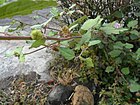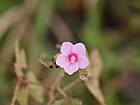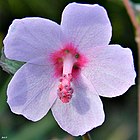Note: This is a project under development. The articles on this wiki are just being initiated and broadly incomplete. You can Help creating new pages.
Difference between revisions of "Urena lobata"
| (8 intermediate revisions by the same user not shown) | |||
| Line 1: | Line 1: | ||
| − | + | '''Urena lobata''' is a fast-growing, spreading, branched shrub that can reach a height of 4 - 5 metres. It is often treated as an annual, however, when it will reach a height of 0.5 - 2.5 metres and, if grown closely together, will not branch much. | |
==Uses== | ==Uses== | ||
| − | {{Uses|}}, {{Uses|}}, {{Uses|}}, {{Uses|}}, {{Uses|}}, {{Uses|}}, {{Uses|}}, {{Uses|}}, {{Uses| | + | {{Uses|Bowel complaints}}, {{Uses|Colic}}, {{Uses|Stomach-ache}}, {{Uses|Diarrhoea}}, {{Uses|Dysentery}}, {{Uses|Headache}}, {{Uses|Fractures}}, {{Uses|Wounds}}, {{Uses|Snake bites}}.<ref name="Uses"/> |
==Parts Used== | ==Parts Used== | ||
| − | {{Parts Used|}}, {{Parts Used| | + | {{Parts Used|Root}}, {{Parts Used|Stem}}, {{Parts Used|Leaf}}<ref name="Karnataka Medicinal Plants"/>. |
==Chemical Composition== | ==Chemical Composition== | ||
| − | <ref name="chemical composition"/> | + | It contains alkaloids, cardiac glycoside, tannins, terpenoid and saponin.<ref name="chemical composition"/> |
==Common names== | ==Common names== | ||
| − | {{Common names|sa=Atibala, Bala|en=Aramina, Bur mallow|gu=Vagadau bhindo|hi=Bachita, Lapetua|kn=ದೊಡ್ಡ ಬೆಂಡೆ Dodda bende, ಕಾಡು ತುತ್ತಿ Kaadu thutthi | + | {{Common names|sa=Atibala, Bala|en=Aramina, Bur mallow|gu=Vagadau bhindo|hi=Bachita, Lapetua|kn=ದೊಡ್ಡ ಬೆಂಡೆ Dodda bende, ಕಾಡು ತುತ್ತಿ Kaadu thutthi|ml=Oorppanam, Uram|mr=Ran tupkuda, Vanbhendi|ta=Ottu-t-tutti|te=Nalla benda, Padanikaada}}<ref name="Common names"/> |
| − | <ref name="Common names"/> | ||
==Properties== | ==Properties== | ||
| Line 17: | Line 16: | ||
===Dravya=== | ===Dravya=== | ||
===Rasa=== | ===Rasa=== | ||
| − | |||
===Guna=== | ===Guna=== | ||
| Line 30: | Line 28: | ||
==Habit== | ==Habit== | ||
| − | {{Habit|}} | + | {{Habit|Shrub}} |
==Identification== | ==Identification== | ||
| Line 37: | Line 35: | ||
===Flower=== | ===Flower=== | ||
| − | {{Flower||||}} | + | {{Flower|||||Flowering from July to January}} |
===Fruit=== | ===Fruit=== | ||
| − | {{Fruit||||||}} | + | {{Fruit||||||Fruiting from July to January}} |
===Other features=== | ===Other features=== | ||
| Line 49: | Line 47: | ||
==Mode of Propagation== | ==Mode of Propagation== | ||
| − | {{Propagation|}} | + | {{Propagation|Seeds}} |
==How to plant/cultivate== | ==How to plant/cultivate== | ||
| − | <ref name="How to plant/cultivate"/> | + | The plant has spread widely as a weed throughout the wet to semi-arid tropics and into the subtropics. It is sometimes cultivated as an annual in cooler climates.<ref name="How to plant/cultivate"/> |
==Commonly seen growing in areas== | ==Commonly seen growing in areas== | ||
| − | {{Commonly seen|}}, {{Commonly seen|}}, {{Commonly seen|}}, {{Commonly seen|}}, {{Commonly seen|}}. | + | {{Commonly seen|Roadsides}}, {{Commonly seen|Waste places}}, {{Commonly seen|Fallow fields}}, {{Commonly seen|Plantations}}, {{Commonly seen|Secondary growth}}. |
==Photo Gallery== | ==Photo Gallery== | ||
<gallery class="left" caption="" widths="140px" heights="140px"> | <gallery class="left" caption="" widths="140px" heights="140px"> | ||
| − | + | Arya-Urena lobata-jayana-2019-01.jpg | |
| + | Arya-Urena lobata-jayana-2019-02.jpg | ||
| + | Bunga senduduk 2.jpg | ||
| + | Caesar Weed - Urena lobata, Bird Rookery Swamp, Collier County, Florida.jpg | ||
| + | Caesarweed (Urena lobata) (8038461990).jpg | ||
| + | Jungli Kapashi (Marathi- जंगलीकापशी) (4105572998).jpg | ||
</gallery> | </gallery> | ||
| Line 65: | Line 68: | ||
<references> | <references> | ||
| − | <ref name="chemical composition">[ | + | <ref name="chemical composition">[https://academicjournals.org/journal/JMPR/article-abstract/6CDD13533823 Chemical constituents]</ref> |
| − | <ref name="Leaf">[ | + | <ref name="Leaf">[Morphology]</ref> |
| − | <ref name="Common names">[https://sites.google.com/site/indiannamesofplants/via-species/u/urena-lobata | + | <ref name="Common names">[https://sites.google.com/site/indiannamesofplants/via-species/u/urena-lobata Common names]</ref> |
| − | <ref name="How to plant/cultivate">[ | + | <ref name="How to plant/cultivate">[http://tropical.theferns.info/viewtropical.php?id=Urena+lobata Cultivation details]</ref> |
<ref name="Uses">Indian Medicinal Plants by C.P.Khare</ref> | <ref name="Uses">Indian Medicinal Plants by C.P.Khare</ref> | ||
| + | |||
| + | <ref name="Karnataka Medicinal Plants">”Karnataka Medicinal Plants Volume-3” by Dr.M. R. Gurudeva, Page No.823, Published by Divyachandra Prakashana, #6/7, Kaalika Soudha, Balepete cross, Bengaluru</ref> | ||
</references> | </references> | ||
==External Links== | ==External Links== | ||
| − | * [ ] | + | * [https://keyserver.lucidcentral.org/weeds/data/media/Html/urena_lobata.htm Urena lobata on lucidcentral.org] |
| − | * [ ] | + | * [https://indiabiodiversity.org/species/show/231425 Urena lobata on indiabiodiversity.org] |
| − | + | ||
[[Category:Herbs]] | [[Category:Herbs]] | ||
Latest revision as of 18:46, 24 January 2022
Urena lobata is a fast-growing, spreading, branched shrub that can reach a height of 4 - 5 metres. It is often treated as an annual, however, when it will reach a height of 0.5 - 2.5 metres and, if grown closely together, will not branch much.
Contents
- 1 Uses
- 2 Parts Used
- 3 Chemical Composition
- 4 Common names
- 5 Properties
- 6 Habit
- 7 Identification
- 8 List of Ayurvedic medicine in which the herb is used
- 9 Where to get the saplings
- 10 Mode of Propagation
- 11 How to plant/cultivate
- 12 Commonly seen growing in areas
- 13 Photo Gallery
- 14 References
- 15 External Links
Uses
Bowel complaints, Colic, Stomach-ache, Diarrhoea, Dysentery, Headache, Fractures, Wounds, Snake bites.[1]
Parts Used
Chemical Composition
It contains alkaloids, cardiac glycoside, tannins, terpenoid and saponin.[3]
Common names
| Language | Common name |
|---|---|
| Kannada | ದೊಡ್ಡ ಬೆಂಡೆ Dodda bende, ಕಾಡು ತುತ್ತಿ Kaadu thutthi |
| Hindi | Bachita, Lapetua |
| Malayalam | Oorppanam, Uram |
| Tamil | Ottu-t-tutti |
| Telugu | Nalla benda, Padanikaada |
| Marathi | Ran tupkuda, Vanbhendi |
| Gujarathi | Vagadau bhindo |
| Punjabi | NA |
| Kashmiri | NA |
| Sanskrit | Atibala, Bala |
| English | Aramina, Bur mallow |
Properties
Reference: Dravya - Substance, Rasa - Taste, Guna - Qualities, Veerya - Potency, Vipaka - Post-digesion effect, Karma - Pharmacological activity, Prabhava - Therepeutics.
Dravya
Rasa
Guna
Veerya
Vipaka
Karma
Prabhava
Habit
Identification
Leaf
| Kind | Shape | Feature |
|---|---|---|
Flower
| Type | Size | Color and composition | Stamen | More information |
|---|---|---|---|---|
| Flowering from July to January |
Fruit
| Type | Size | Mass | Appearance | Seeds | More information |
|---|---|---|---|---|---|
| Fruiting from July to January |
Other features
List of Ayurvedic medicine in which the herb is used
Where to get the saplings
Mode of Propagation
How to plant/cultivate
The plant has spread widely as a weed throughout the wet to semi-arid tropics and into the subtropics. It is sometimes cultivated as an annual in cooler climates.[6]
Commonly seen growing in areas
Roadsides, Waste places, Fallow fields, Plantations, Secondary growth.
Photo Gallery
References
- ↑ Indian Medicinal Plants by C.P.Khare
- ↑ ”Karnataka Medicinal Plants Volume-3” by Dr.M. R. Gurudeva, Page No.823, Published by Divyachandra Prakashana, #6/7, Kaalika Soudha, Balepete cross, Bengaluru
- ↑ Chemical constituents
- ↑ Common names
- ↑ [Morphology]
- ↑ Cultivation details
External Links
- Ayurvedic Herbs known to be helpful to treat Bowel complaints
- Ayurvedic Herbs known to be helpful to treat Colic
- Ayurvedic Herbs known to be helpful to treat Stomach-ache
- Ayurvedic Herbs known to be helpful to treat Diarrhoea
- Ayurvedic Herbs known to be helpful to treat Dysentery
- Ayurvedic Herbs known to be helpful to treat Headache
- Ayurvedic Herbs known to be helpful to treat Fractures
- Ayurvedic Herbs known to be helpful to treat Wounds
- Ayurvedic Herbs known to be helpful to treat Snake bites
- Herbs with Root used in medicine
- Herbs with Stem used in medicine
- Herbs with Leaf used in medicine
- Herbs with common name in Kannada
- Herbs with common name in Hindi
- Herbs with common name in Malayalam
- Herbs with common name in Tamil
- Herbs with common name in Telugu
- Herbs with common name in Marathi
- Herbs with common name in Gujarathi
- Herbs with common name in Sanskrit
- Herbs with common name in English
- Habit - Shrub
- Index of Plants which can be propagated by Seeds
- Herbs that are commonly seen in the region of Roadsides
- Herbs that are commonly seen in the region of Waste places
- Herbs that are commonly seen in the region of Fallow fields
- Herbs that are commonly seen in the region of Plantations
- Herbs that are commonly seen in the region of Secondary growth
- Herbs





